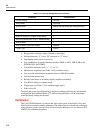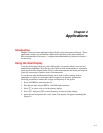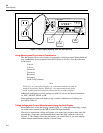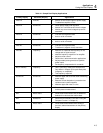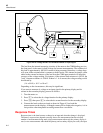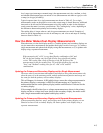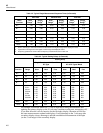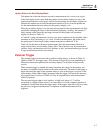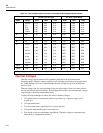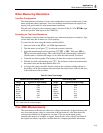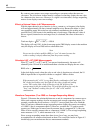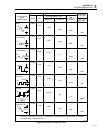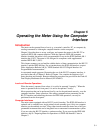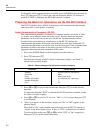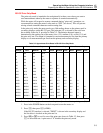
45
Users Manual
4-8
Table 4-4. Typical Measurement Intervals (in Seconds) for Dual Display Measurements
All AC or All DC Type AC & DC Types Mixed
Meas. Range Slow Med Fast Slow Med Fast
V 300 mV
3V
30V
300V
1000V
0.70
0.70
0.80
0.80
0.80
0.50
0.50
0.60
0.60
0.60
0.10
0.10
0.10
0.10
0.10
1.10
1.00
1.10
1.00
1.00
0.90
0.80
0.90
0.80
0.80
0.10
0.10
0.10
0.10
0.10
W All 1.80 1.60 0.50 2.30 2.10 0.50
A All 0.70 0.50 0.10 0 90 0.70 0.10
B All 1.50 1.30 0.50 1.80 1.60 0.50
e 300 Ω
3 kΩ
30 kΩ
300 kΩ
3 MΩ
30 MΩ
300 MΩ
0.70
0.80
0.90
1.40
1.30
1.90
2.10
0.50
0.60
0.70
1.20
1.10
1.70
1.90
0.10
0.10
0.10
0.10
0.10
0.10
0.10
N/A
N/A
N/A
N/A
N/A
N/A
N/A
N/A
N/A
N/A
N/A
N/A
N/A
N/A
N/A
N/A
N/A
N/A
N/A
N/A
N/A
GR N/A 0.70 0.50 0.10 N/A N/A N/A
FREQ* N/A 0.50 0.50 0.30 0.70 0.70 0.30
* Frequency greater than 150 Hz. Refer to frequency measurement rates in Table 3-6.
Thermal Voltages
Thermal voltages are the thermovoltaic potentials generated at the junction between
dissimilar metals. Thermal voltages typically occur at binding posts and can be greater than 1
µV. When making low-level tic measurements, thermal voltages can present an additional
source of error.
Thermal voltages can also cause problems in the low ohms ranges. Some low-value resistors
are constructed with dissimilar metals. Just handling such resistors can cause thermal voltages
large enough to introduce measurement errors.
Use the following techniques to reduce the effect of thermal voltages:
1. Use similar metals for connections wherever possible (e.g., copper-to-copper, gold-
to-gold, etc.).
2. Use tight connections.
3. Use clean connections (especially free of grease and dirt).
4. Use caution when handling the circuit under test.
5. Wait for the circuit to reach thermal equilibrium. (Thermal voltages are generated only
where there is a temperature gradient.)



